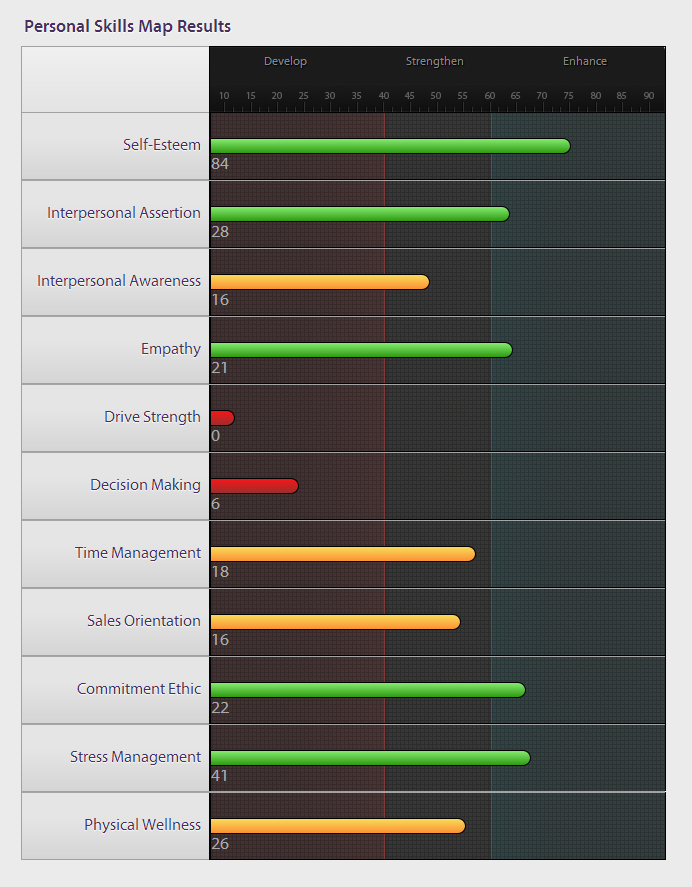
In a previous blog we discussed Improving Retention Using The Success Profiler®. In this study, the eleven scales of The Personal Skills Map® (a core assessment of The Success Profiler) were identified as critical factors in improving student retention and academic performance. This study takes a closer look at three of the eleven key scales in The Personal Skills Map that seem to help predict student retention.
In a dissertation published in 2004 by Magdalena Williams entitled Achievement and Retention Patterns in a Predominantly Hispanic Serving Institution of Higher Education, Williams chronicles a study on retention/academic achievement. The focus of this research was on two variables considered to be critical to retention/academic performance. These factors were identified as academic and non-academic factors.
Academic Factors:
The academic factors included in the study were ACT/SAT scores, recommended/distinguished high school curriculum, and grades from Texas A&M University-Kingsville foundation courses.
Non-Academic Factors:
The living-learning community and emotional intelligence programs were the non-academic factors included in the study.
Living-Learning Community
The purpose of the living-learning community, according to Brenda Handley(2003), “is to develop and foster a sense of community that assists freshmen with their adjustment to university life. The intent of the organization is to provide
opportunities for its members to enhance social, personal and academic peer support networks that encourage emotional, psychological and intellectual development, as well as promote community service.” Simply stated, when a student develops asense of community or belonging, the student is more likely to stay on a college campus.
Emotional Intelligence
Social/emotional intelligence is a learned ability to identify, experience, understand and express human emotions in healthy and productive ways. Emotionally intelligent individuals possess skills that allow them to adjust to their surroundings and adapt to new situations. (Sternberg, 1995)
The Personal Skills Map (Nelson and Low, 1976) was used as an assessment instrument to measure social/emotional intelligence for one of the non-academic factors affecting student retention in this study. The scales included in The Personal Skills Map are: self-esteem, interpersonal assertion, interpersonal awareness, empathy, drive strength/motivation, decision making, time management, sales orientation/leadership, commitment ethic, stress management and physical wellness.
Research Design
Correlational research was used to analyze the following data of the Fall 2002 cohort of first-year freshmen: (1) ACT/SAT scores; (2) high school class rank; (3) grades received in foundation courses; (4) whether students took the “recommended” or “distinguished” high school curricula; (5) whether students participated in a living-learning community; and (6) students’ emotional intelligence skill measures from The Personal Skills Map. The data were analyzed to determine which factors were significant predictors of retention and academic achievement.
Population
Approximately 960 first-year freshmen entering Texas A&M University-Kingsville in the fall of 2002 were the sample population for this study.
Instrumentation
Data collected from Texas A&M University-Kingsville student information system, the living-learning community program, and the Emotional Intelligence Program were used in the study.
Results – Academic Factors:
Results of the study showed that the students retained had:
- higher ACT scores
- higher cumulative grade point averages
- higher foundation course grades
- took recommended high school curricula
Out of all of the above cumulative grade point average at the end of the first academic year was the strongest predictor of retention.
Results – Non-Academic Factors:
Results of the study showed:
- students who successfully participated in the living-learning community program were more likely to be retained
- results of the emotional intelligence assessment showed statistically significant relationships between retention and three of the emotional intelligence skills measured by The Personal Skills Map— drive strength/motivation, time management and commitment ethic. Of the three skills, commitment ethic was the strongest predictor of student retention.
Click here to learn more about our social/emotional intelligence programs.


